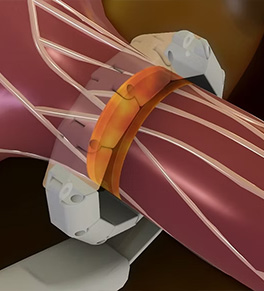
Kidney Cancer
Fortunately, most cases of kidney cancer are curable if caught early.
Today, we treat kidney cancer with minimally invasive techniques so you can get back to living life.
UCI Health doctors have pioneered the development of new kidney cancer therapies and surgical techniques.
Signs and symptoms of kidney cancer
Your kidneys are your body’s filtration system, cleaning your blood and producing urine.
The most typical kidney cancer symptoms are:
- blood in the urine
- back pain or pain below the ribs
- a mass felt during a physical exam
The following symptoms are not specific to kidney cancer itself but can still indicate an issue:
- Intermittent fevers or night sweats
- Fever not associated with a cold or flu
- Fatigue and lethargy
- Unexplained weight loss that can sometimes be rapid
- Pain in other parts of the body if the cancer has spread
However, in the earlier stages of this illness you may be asymptomatic. We often discover kidney cancer during a general checkup or when you seek help for a nonspecific complaint.
The most common type of kidney cancer is called renal cell carcinoma.
When to seek care
See your doctor as soon as you have blood in your urine. If you don’t have any physical injuries but experience chronic back pain or pain under your ribs, also seek care.
You’re always welcome to reach out to us directly at the UCI Health Urologic Cancer Care Program.

Kidney cancer is serious, but manageable
Partner with us to take advantage of our innovative techniques and faster recovery times.
Call 714-456-7005 to speak with a kidney cancer expert.

Find a cancer clinical trial
Talk to your doctor to see if a cancer clinical trial is right for you.
Featured Blog Posts

Gastric cancer survivor credits novel clinical trial therapy

First U.S. test of nerve-blocking device for resistant hypertension
Procedure zaps renal artery nerves linked to hypertension without damaging the blood vessel.

Riding for prostate cancer awareness
Kidney cancer diagnosis at UCI Health
The two classic signals of kidney cancer, blood in the urine and back pain, are important indicators. Their presence could mean the illness is at an advanced stage, but not always.
You may find yourself at the doctor’s office with stomach problems or some other complaint. It’s possible to find kidney tumors “by accident” through imaging tests originally meant for a different diagnosis.
Kidney cancer is often slow-growing, and smaller growths tend to be benign while larger growths are usually malignant. After your doctor spots a suspicious lesion, you’ll come in for follow-up imaging within three to six months. If there’s no change in the mass, we’ll schedule you for periodic follow-ups.
Who is most at risk
Early detection can save your life. If you fall into several of these risk categories, consider getting an evaluation:
- Obesity
- High blood pressure
- High fat diet
- Gender—Men are almost twice as likely as women to develop kidney cancer
- Cigarette smoking
- Occupational and chemical exposure
- Dialysis
- Von Hippel-Lindau disease
- Hereditary papillary renal cell carcinoma
- Birt-Hogg-Dube syndrome
Getting an in-office biopsy
Your doctor may determine that you need a biopsy if doing so helps create your treatment plan. We use advanced ultrasound-targeting technologies to biopsy small renal masses. We do this procedure in an outpatient setting with minimal pain.
The data we get from your biopsy allows our experts to offer you targeted treatment strategies.
However, we biopsy kidney tumors only if absolutely necessary. There’s a small chance the procedure could spread the cancer, or it could produce a false negative.
Kidney cancer treatment at UCI Health
For diagnosis and treatment at UCI Health, you’ll meet with a urologic oncologist. These specialists are fellowship trained in both the genitourinary tract and cancer.
The first line treatment for kidney cancer is surgery. If we don’t remove the malignancy, it can compromise your kidney function and spread to other tissues in your body.
In some cases where surgery isn’t needed, our initial treatment is to maintain active surveillance through regular imaging.
Why choose UCI Health for kidney cancer care?
Our surgery practice is world class
Dr. Clayman’s pioneering contribution to the field of urology set a worldwide standard. Laparoscopic surgery has dramatically improved safety and outcomes for thousands of patients. After this initial breakthrough, Dr. Clayman went on to invent nearly a dozen other devices for performing minimally invasive surgical procedures.
We have multiple doctors, including the Chair of the Urologic Cancer Program, who perform complex robotic kidney surgeries. This collective level of experience is available in very few centers
We’re dedicated to educating the next generation of doctors
As an academic medical center, we’re wholly dedicated to your patient experience and delivering high quality treatment. That includes preparing the next generation to deliver continuity of care to an exceptionally high standard.
The UCI Health Urologic Cancer Program does ongoing research and offers clinical trials
If a kidney cancer trial is available and you qualify, you might be able to participate. You’d gain access to novel treatments and tools not yet widely available. Participating in a trial also helps future kidney cancer patients.




